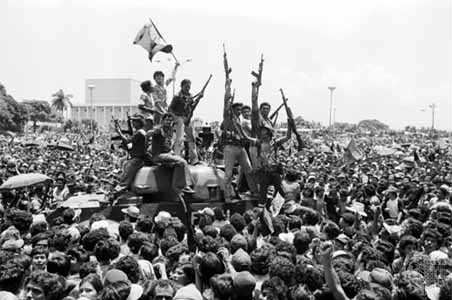Mauritius: Victory in struggle for decriminalisation of abortion

By Lindsey Collen
July 20, 2012 -- Links International Journal of Socialist Renewal -- Victories, even partial, are rare in these times. The revolutionary socialist party LALIT ("Lalit" means "struggle" in Kreol) would like to share with you an important development in the class struggle and struggle for women’s emancipation in Mauritius. LALIT is the only political party in Mauritius that has, over the decades, campaigned for abortion decriminalisation, and finally last month parliament passed a new abortion law to replace the 1838 total ban on any abortion. Everyone in the country knows that this is a LALIT struggle, as our stand on abortion decriminalisation had often been used “against” us. So, it is like getting accumulated “support”.
This victory comes less than a year after another victory accredited to LALIT: the introduction into schools of the mother tongues, Kreol and Bhojpuri, for the very first time in 2012.
Greece: Syriza shines a light -- radical left organises for power

Syriza leader Alexis Tsipras serves food at an annual anti-racist festival organised by 250 civic organisations.
Ian Angus: The return of the population bombers

Earth Day 1970 poster. People are the enemy.
Washington and the Cuban Revolution: Ballad of a never-ending policy -- triumph and reaction

[This is the second in a series of articles by Ike Nahem. The first can be found HERE. For more articles on Cuba, click HERE.]
By Ike Nahem
July 22, 2012 – Links international Journal of Socialist Renewal -- On January 1, 1959, Cuban revolutionaries, led by Fidel Castro, swept into power and established a provisional revolutionary government across the length of the island, overthrowing the exceedingly venal military regime of Fulgencio Batista.
The revolutionaries (including such remarkable figures as Juan Almeida, Raul Castro, Camilo Cienfuegos, Ernesto Che Guevara, Armando Hart, Celia Sanchez and Haydee Santamaria) marched into Havana, culminating a three-year campaign that combined rural guerrilla war with a vast urban revolutionary underground.
Pakistan: Urgent action needed to stop torture of activists

STOP PRESS, July 25, 2012 -- Thanks to all who sent protest messages and got the word out quick. Baba Jan and Iftikhar Hussain have now been returned to jail after being interrogated and roughed up by the special interrogation team. But we we still must demand: Free Baba Jan and Free the Hunza Five! -- Peter Boyle
By Peter Boyle, Socialist Alliance (Australia) national co-convener
July 23, 2012 -- Links International Journal of Socialist Renewal -- A leading Pakistan newspaper, Dawn, reports that Labour Party Pakistan comrades Baba Jan and Iftikhar Hussain are being tortured by special "anti-terrorist police" unit in an undisclosed location now: http://dawn.com/2012/07/23/gilgit-rights-activist-being-given-the-third-degree/
July 20, 2012 – GreenLeftTV – A popu
China, Apple and the labour process

Book excerpt: Barry Sheppard on the triumph and defeat of the 1979 Nicaraguan revolution

The Nicaraguan people celebrate victory over the Somoza dictatorship in central Managua, July 20, 1979.
By Barry Sheppard
July 19, 2012 – Links international Journal of Socialist Renewal --The following are two chapters from volume 2 of my political memoir about my time in the US Socialist Workers Party (SWP). They give an overview of the triumph and eventual collapse of the Nicaraguan revolution (1979 through the 1980s) under the blows of US imperialism’s war against the small and impoverished country.
It is important for socialists today to not forget the victories and defeats of the past, and their lessons for the future. One of the lessons of the Nicaraguan revolution, like the Paris Commune, the Russian, Chinese, Yugoslavian, Vietnamese and Cuban and other revolutions, as well as revolutionary upsurges that didn’t take power, like the German one (1917 to 1923), the May-June 1968 near revolution in France, the Portuguese revolutionary events of 1974-1975, the Prague Spring of 1968, the rise of the Polish workers in 1970, etc. is the power of the workers and peasants when they enter the stage of history in their own name and interests.
Israel’s environmental colonialism and eco-apartheid

The construction of Israel’s mammoth apartheid wall has separated Palestinian farmers from their fields and destroyed Palestinians'
Video: 'The Story of Change' -- Can shopping save the world? (with script)
Cuba's coming co-operative economy?

Havana billboard: “We are working – and you?”
By Marcelo Vieta
South Africa: The ANC's 'second transition' to what?

By Vishwas Satgar, Johannesburg
July 13, 2012 -- Amandla! --The African National Congress (ANC), South Africa's ruling party for almost two decades, held a policy conference in June. There are many ideas and policy perspectives up for discussion but the "big idea" framing the discussion is captured in a 47-page long document entitled: The Second Transition? Building a National Democratic Society and the Balance of Forces in 2012.